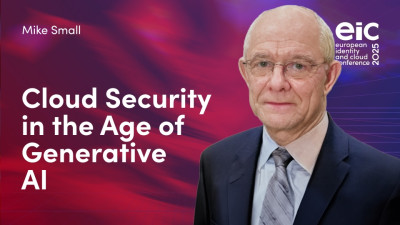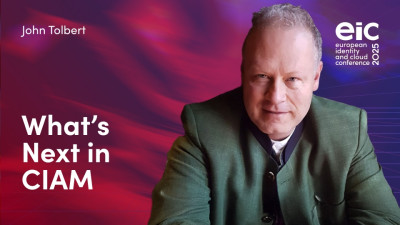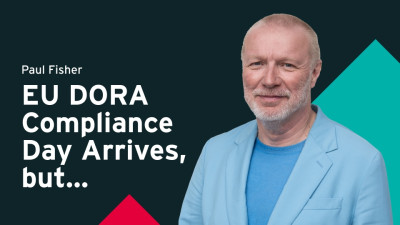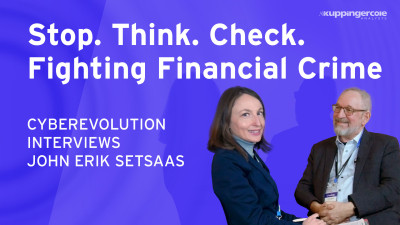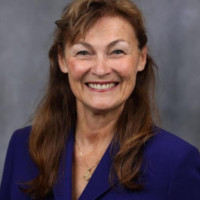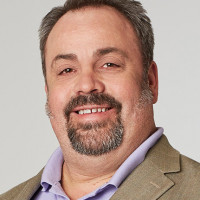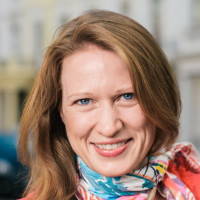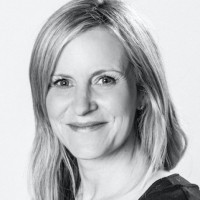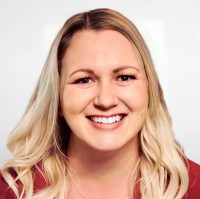And, and I'm gonna use the microphone. Oh, yes.
So, so that way you can hear me because I'm quiet, non assuming, and you can't hear my voice. Welcome everybody. So we have an illustrious panel here, and we are gonna be talking about community, specifically, how we get involved, what they do, and, and just in general, any questions that you guys have. So we're gonna start off a couple of prepared comments and some questions, and then it's open floor for you guys, any questions you have about communities in general, our communities, other communities which we may have opinion on.
So, having said that, I'm not going to go through and introduce everybody. I'm gonna ask everybody to sort of introduce themselves and talk just a little bit, a couple of minutes around their sort of community and talk a little bit about those. And I'm gonna start all the way on the far end.
Victoria, you get to go first.
All right.
That's it for the rest of us. That's it?
That's it.
That's all we got.
I tried with my best radio voice.
All right, Bojo, everybody. My name is v Tori Beci. I work for Okta as architect. I've been in identity space for the last couple of decades at the intersection between identity and developers. And developers are my people. Okay. So I gravitate around the communities that have touchpoints with developers. I serve on the Open foundation board and I'm a blue collar everywhere else.
So in itf, in ID Pro, and various other communities where identity professionals and developers congregate. And, and that's it for me
Before. Oops. Before we carry on, can we bring up that first poll? We've just got a couple of questions on here as to what, how you guys participate in the community. So while we are going through them, if you can fill that in. We need to see your answers. We'll know if you didn't answer. Okay. Kale.
Hi. .
I, as a, as a human being, I'm quite mission driven in wanting to improve the ability for people to assert their identity online and in person. And so I do that in two ways. I have two hats.
One, I'm the executive director of the Open ID Foundation, and second, I'm an advisor to the California government, the Department of Motor Vehicles on their digital identity program. And the reason I'm wearing both of these hats as a, as a human being is that I think that's a useful place for me to put myself and try and help solve some of these structural problems that we're seeing. Build better identity infrastructure for the world.
And, you know, cross the chasm. What could take 20 plus years to roll out great digital identity infrastructure with the wonderful technologies we've heard talked about in places like eic.
Actually, how could you do that more swiftly?
Can you do it in 10 years? Can you do it in five years? So from an open ID foundation perspective, for those who aren't familiar with it, our mission is very similar. It's to help people assert their identity in person and online. And to help lead the global community in developing standards that will deliver on a privacy preserving, standards based interoperable cap set of capabilities. And we know that one accomplishes our mission and vision through working closely with others.
And so we see it as we're just one piece of a bigger pie and how can we fulfill our mission and vision by working through the community. So thank you for coming to the session.
I, Ian Glazer, I am the co-founder and board emeritus member for ID Pro. ID Pro is the professional Association for Digital Identity. And we hope to bring excellence in the practice of identity management, specifically focusing on the needs of the practitioner. You'll hear from some of my colleagues ID pro is a little bit different in that we are not focused on standards or technology per se, we're focused on skills development and knowledge in sort of a vendor neutral approach to help practitioners learn from materials as well as one another.
And we really pride ourselves on creating a safe space where people who are both new to identity management or have been around quite some time can interact and can ask questions of one another. And it is truly heartening to be here at eic representing Id Pro because many years ago, I wanna say seven or more, eight, we first floated the idea of ID pro on stage and it's very kind of Kuppinger called to allow us to do that. And we have only grown from there. And that's me,
Kelly.
Thanks Alan and Ian.
My name is Kelly Mosman and I currently am the director of Global Community Engagement at Ford Rock. So in the context of the conversation today, I'll be, you know, kind of approaching this through the lens of creating community around a product and what that space looks like and, and what things enable the engagement necessary to extend knowledge and support one another as they, you know, acclimate to a product or, you know, reduce time to hello world and just in general product adoption on a more broad context or level than that, y'all geek out over identity and I geek out over community.
I love the community space. I love what it enables, the different ways that it can provide value to, to businesses. And at my core, and I think a lot of this has to do with my upbringing in the southeastern part of the United States where, you know, it's very southern, there's lots of cultural community around that I fundamentally aim to to, to support community members.
So while I work for Ford Rock and ultimately they, you know, pay my salary and financially enable the community around their products, I secretly seek to enable the community more than the bottom line for four trucks.
So it's an interesting perspective to take when you want to enable a community of practitioners and not necessarily have any care or concern. I mean, I know that that's relative for the bottom line, right? I don't exist to serve the bottom line. I exist to serve the community and enable those practitioners. So it's an interesting place to be, especially in this conversation when there's so much community happening around, you know, potentially more inspiring, you know, inspiring conversations. Not that for Jock isn't, but Right. The affecting more change on, on a more global scale.
Anyway, sorry. Thank you.
It
Was a secret until you told us
All.
We, we won't tell, won't tell it. Nobody
Can tell anyone.
So my name's Linley. I've spent 20 years working the identity industry. I've got two jobs. One is as managing director of an identity company called Cath. Also as co-founder of Women in an Identity. Women in an Identity is a community. It's not just about women. I dunno if anyone saw my keynote, but it's not just about women. So anybody can join, it's free to join. We have four pillars to, to what we do.
Kind of our, our mission and vision is around bringing more diversity to the digital identity industry, more inclusion into our products. And we do that through kind of four things. So we have a job sport so that people can get, you know, more jobs in the identity industry. We do research, we do policy. And what's the fourth thing we do? Events. That's the other thing that we do. I almost forgot them. We do events.
It
Was gone. It was gone. I was like, what's the fourth thing? And we do events as well. So you know, our events, the women identity is free to join.
Our events are free to come to, if you become a member, you get a newsletter, you know, you get all the jobs sent out to you. So yeah, join, everyone should
Join. Cool. Okay.
Hi, I'm Kay Chopard. I'm the executive director of the Qatar Initiative, but I have to make a true confession that before I came there, I've only been there about a year and a half.
I, I'm actually, and and still am a dues paying member of ID Pro. And I have been working with Emma for several years now with Women in Identity and I'm still on their global board.
So, you know, a lot of, a lot of good cross pollination happening there. But at the Qatar Initiative, I don't know if you're familiar with them, we're also a nonprofit and we're a membership organization and, but we kind of wear two different hats. And one is with the membership. We have work groups and discussion groups and we also, you know, ha go to conferences and do all these things. We're really focused on standards and really trying to work on cutting edge emerging issues to try to move what's happening in the field into the arena standards.
And then on the other side, we run two certification programs. We do certification and now people, some people don't like me to use that word because in the US NIST refers to them as assurance levels. So we do assessments for assurance levels for identity assurance, authentication and federation, all under the NIST standards in the US We are also in the uk. We have an office now in the UK and we do certification against the UK Digital identity and attributes trust framework.
In many ways it's kind of its own little piece, even though it's very connected to the work of the members around standards, around really creating all of the, the criteria and the, and the schema and the details if you will, that go into third party conformance assessments. We have accredited auditors, we have pretty stringent retires. I will re requirements, sorry, I've actually will admit to having suspended one for a brief time because they were required to be in compliance and they were not.
So I just want you to know that we hold very high standards and we try very hard to keep that very impartial. So it's a little bit schizophrenic because if you've ever dealt with auditors, you know that they're not maybe your friends in general, but we have a lot of community around all of the work and people who really believe in standards and believe in that kind of integrity. And I'm excited to be a part of it. I'm probably the newest person in my role, but I'll, I'll stop now.
Okay, cool. Well thanks everybody. So when we started, we said there was that poll, the poll was really just to see of our audience in here, how much activity you guys are in community. So hopefully Oh, oh wow, okay. No one's in all of them.
Okay, so we've got some, some, what is a community folks, why should I get involved? And we've got some folks who me belong to several communities. And so really nice across the board. Maybe there was only three answers. I don't know.
However, that actually brings up a really interesting point. As we've been going through the introductions in here, there have been at least half a dozen different communities each one of which was sort of different. And I'm gonna throw this one at you Ian, why, why so many? And if we are looking for how to get involved, how do we start?
Communities are like standards and the more we have, the better we need a
Standard.
I'm just trying that answer out.
I don't, I don't, I don't actually think that's the, the right answer. Let me try this one.
Which is, when you started identity as a practitioner, think to yourself how you started, where you started under what auspices some of us started and maybe the more technical side and you maybe gravitated to both the developer experience, the standards that you're implementing. Other of us may have started from more of the project or program side. And so you're trying to get a grasp on how do we do this stuff, not the wrench training aspect, but how do we pragmatically actually bring this thing to the world, whatever it is.
So because we have a really diverse entry point into identity management and as of yet there really hasn't manifest say university courses about this. So we don't have people that are coming out of university who are identity practitioners.
What we have are history majors and computer science people and, and all of these other kinds of academic and non-academic backgrounds and thrust into identities somewhere somehow. And so if only as a reflection of the community that we are actually in, we should expect a pretty diverse kind of set.
And if you are in this sort of group that is only maybe of respondents that maybe doesn't really understand what the community is, the way to think about it is it is a safe space to find like-minded individuals in terms of interests. The very basic, and your interest or your need may be I want to go work on the wire line. What happens on the wire?
How do we make this a better experience for the people that are implementing it, it may mean something slightly different in terms of, hey, what are for my vendor, the vendors that I work with, how do I build, you know, where do I find peers that are doing similar things?
It may mean, well as just a generic practitioner, how do I get proficient faster? How do I find different kinds of insights I may not have? And it may be as a solution provider, how do I demonstrate to others that we do the right things?
So this sort of marketplace of community is actually really powerful because it represents our, or reflects our diverse sort of constituents in the space. And so a takeaway I think that my panelist would agree with, and if not that will get fun is these aren't islands, right? There is a lot of cross pollination for good reason. And there is often a great deal of not so much mission overlap, but certainly membership overlap. And one of the things that may be daunting is like, oh crap, where do I start? Right?
So I wanna ask my panelists, I'm gonna make this weird, what is the first sort of community in the identity space that you joined? Like I'm looking at Vitoria, let's start with Vitoria.
Well, I'd say that the first identity community I joined was stuck overflow
As in had to get things done. And my peers knew Jock about identity. And so I had to go to Google and find things out and that's where I started. And the thing is that you'll see recurrent people, people that answer a lot of questions. And then you start looking at these people say, okay, where are you from? And sometimes you see that more people that answer the questions come from the same place and not the same company but the same community and then just percolate for these.
And eventually you find the watering halls, the good places and that's, that's how you land the community. And then the other thing is that once you sometimes develop personal relationships, the people will tell you, Hey, you know, you should join Idra.
And, and that's how it works.
I've taken up deputy monitoring, I'm looking at Emma like what community do you start with?
Did I start?
Yeah,
Did you start with, do you know
You're gonna love this answer?
That's why I asked you
Id pro.
Yeah,
I think it was. Yeah. Oh shit.
Yeah, like a proper like community. Yeah.
That's awesome. Yeah. That's so cool.
Yeah, there you go.
Yeah, most panels you're like, oh God, if the, the speaker freezes with the previous speaker, it's like the worst panel ever. But in this case I feel like, oh,
Group hug environment.
Yeah, no, I think it was, yeah, yeah, yeah. I, cause I was involved in the open identity exchange, but I think I was on the, on the board of the open identity exchange. But in terms of like an actual community, it was, it was Ali Pro. Yeah. Who's next?
I'll go next.
So for me, I didn't start an identity really until 2016. I was at Apple and I was working on Apple Wallet and I was, you know, put up my hand and said, I, I'm interested in this identity thing and what Apple should do around identity for consumers. And at that point it was a pretty darn small tribe. And it wasn't until a year later where I went to something called an AVA conference. It's the American Association of Motor Vehicle Administrators, which most lay people doesn't roll off the tongue. It's
A community too.
It's a community too.
And you know what this community of motor vehicle administrators are into is hugs. And I thought that was pretty cool.
You know, instead of walking into my prior world of financial services and you go to conferences like this, there's not that many hugs, right? If you look around this conference, the people who are often doing the hugs are in communities, right? Cuz they've been working together, they have authentic relationships and they build those, those bonds. So for me it was meeting a bunch of motor vehicle administrator folks who are responsible for being the issuing authorities for the physical credentials. And they were woefully unprepared for the transition to digital identity credentials.
And I saw that as a wildly problematic issue and something where you don't drive global transformation unless you bring massive tribes of people along with you. And I thought that was a meaningful problem to throw myself at.
Why is everyone looking at me?
I knew I shouldn't have sat in the middle.
Okay, well as I, I sort of mentioned before my first experience in the identity community space is with for Rock. But before that, my first real community experience was an, an experience with scrum.org. I worked with the professional scrum trainer community and it's a global com community of, well now it's probably close to 400, but at the time when I started 150 scrum practitioners, not just scrum practitioners, but you know, validated, rigorously tested and, you know, vetted practitioners of Scrum and and agile space.
And so my experience in community started there and it was a really awesome experience to see how, you know, they would come together to collectively improve courseware and improve, you know, the student experience after attending a class and how the community could have a, an impact on scrum dot org's innovation rate and just the things that were enabled as a result of that community of practitioners is really what got me hooked. I'm like, holy crap, so much is possible. And so that was my first experience and now I'm, I'm hooked, right?
I, I see this value and I will never unsee it. You can't unring the bell.
And so I, I think going forward, I'm always going to be a champion for community because so much awesome stuff happens as a result.
Okay, cool. So I have mine, mine was the Apple user group connection. It was that all apple fanboy thing. That's what we did. But while we're sort of talking about this communities in here, the standards bodies, the first question that I brought up was the sort of how do we get involved and why are there so many, and there's a lot of them, right?
Every, everywhere you look, there's a standards body focusing on something. And so I've sort of got two questions on this. You can't answer both of them because it's several people with standards bodies. But the first one, why do we need to work within the community to build standards? We are smart, why can't we just build them? And sort of the follow up to that one is how, why do we have to look so hard to find all of the different places that standards are being done and, and, and the different organizations.
So let me tell, so being the developer side of Victoria, why do we have to do it together?
Now I'm going to get all philosophical on you.
Yeah, there, there are some, there's some school of thought that says that you measure how advanced the society is by the degree of how parts of it are entrenched into non-zero games together. And I think we have seen this during covid in which some parts of society collapsed and everything else went down, like supply chain and all of that stuff. Like the idea is that if you want to advance, you need to collaborate, you needed to have some level of trust and similar, but if you look at us, not all of us, but some of us, we are here because our company is paying for the plane ticket.
And in general, the magic of them having the money to do that is that they compete in non-zero in a zero of some games. And which is anti tactical to the idea of like, we are making progress.
So we need spaces in which we can leave the weapons at the door, walk in and collaborate truly in the spirit of non-zero games so that we can make the decisions and have like a cover each other. When we go back to our engineering team and say, I'm sorry, you have to add core to the token endpoint and engineering will, there's a lot of work. I don't want to do it.
Well standard now decide you have to do it. And so you have to do it. And if you don't have that tool, you'll just have like a selective pressure in which engineering will do the absolute minimum for maximizing a much money they bring home. So we need these kind of spaces where we can be free to actually think about the problem from the point of view of the people that will consume it rather than the people that will pay our salaries. So that's my take. Good.
Anybody want to take the other part? Gail?
I'll, I'll add in, I'll, I'll, I'll riff on the, the safe spaces and the weapons a little bit. So certainly within the open ID foundation, it's all safe spaces, right? Lots of love, but it's a a, it is a, it's, it's important. I'll come back to the not being just silly, absolutely vital to have the safe spaces. If you really want to turn an inflection point on the direction of a technology and change ecosystems widely, one single player can't do it on their own. It's in incredibly difficult to make systematic changes. You need to have multiple different parties.
And in complex ecosystems like identity, you need people on the relying party side, you need people on the IDE identity provider side and the new world of wallet side. There's many different stakeholder groups that need to have safe spaces to convene and build consensus on what good looks like and then ink that consensus in the form of specifications or guidelines or trust frameworks and, and things along those lines.
So you need to have the safe spaces. What's interesting in the world that we're in is that there are obviously multiple different standards.
And so sometimes the weapons come out between the different standards bodies because people have picked a tribe and then they're like, I wanna go this way. And other groups are like, no, I wanna go this way. And so you're competing on the basis of standards, which is interesting and realistic. And it also, there's a long history and technology of competing on the basis of standards.
And that is, I think, good and fruitful and ultimately constructive to a degree where at some point there's, there's a meta level, like how do you move past the competition of the standards to make sure you're ultimately solving the problems of society and not getting overly entrenched in it's my way or your way. And again, that comes back to the safe spaces and being able to meet in person and try and get past the differences in the technologies and sometimes realize the sum is greater than the parts and sometimes some standards will drift away and die off.
So it's a, it's a marketplace of its own.
So can I tag onto that because I think there's something unsaid here that, that what women in identity have shown through their inclusion studies is really demonstrative of if we want to build solutions and practices that will work for global use cases, then we need diverse representation in the process of construction of those things. That is true, whether they are technical standards, that is true, whether they are good practice for practitioners or the way we can evaluate our skills as those practitioners.
And so the the unsaid thing here is ideas only get stronger when you submit them to pressure of peer review and your peers and having a diverse set of people applying pressure to those things, again, whether it is a technical standard or it is a best practice.
And so I think the other reason why we have these things is because by necessity we have to build the places where we can actually apply pressure and we can find something that's going to harden our ideas, make them stronger, make them better, bring in a viewpoint that would allow all of us to then be able to open up other parts of the world to the way we're gonna interact and what we want to do.
And I think that's super, super important as well.
Okay. I I'm not gonna argue on that. Okay. You're lifting your bike. I
Am.
I was gonna just throw in my 2 cents and, and I, so I didn't get to answer how it is that I got into identity, but in case you wanted to know, I got in by this organization called the Identity Ecosystem steering group. Remember those of you may reme Yeah, I see the heads nodding, right? It was like trial by fire as far as I was concerned.
And yeah, always have Chicago, we'll always have Chicago. Yes, indeed.
So I, I couldn't resist telling you that, but I was just gonna comment about, you know, because can Cantara is one of those kind of standards body types. And I was telling you about the certification and this because this is not my, this is like my second career, right? I did other things in the law for many more years than I've been in identity, but I just wanted to make an observation about the community.
And that is that once companies go through that, at least our certification process, what is fascinating to me is it's intense, right? There's a whole lot of detail to it.
It's a lot of work, it's a huge process. But in the end, I swear they all become like true believers and they, and, and it's like they want to tell everybody else you should do this too. Even though it was like the hardest thing we ever did. And I just think it's fascinating that the significance that you all have said about why it's important and why people need to do this, it's like once they go through that they're like, wow, this is meaningful. It means something, it's a badge of honor.
You went through the fire to get that thing right, and I've been so gratified that there's several companies here who've come up to me and said, so I was just wondering what would I have to do to get my Qatar stamp? It's not technically a stamp, but maybe that's the translation, I don't know. But anyway, and it was just really thrilled. And I think some of that comes from the community, the people who've been with it. And he said, you know what, this may be one of the toughest things you ever do, but it will be so gratifying and, and you're gonna feel good and your product is gonna be good.
And there's a lot of pride in that, and I think that's a good thing.
I wanna e expand on that a little bit, right? Because you're, you're doing such a great job of selling the hard work and the blood, sweat and tears, et cetera, that that it makes us all want to leap forward and join. And so sort of the the extension on that question is how do, what, what's in it for me as a, as a member, right? How do we build the, what's in it for me to join the community? What do we get out of it as a member?
Oh man, I
Go absolutely,
Please, okay, this is where I'm gonna geek out. All right? So there's a simple answer and there's a much more complex answer. The simple answer is value is in the eye of the beholder, right? That's simple, simple answer. On a more complex level, it kind of invites the conversation to really broadly think about community as a product.
Yes, I realize, you know, I talked about four rock product community, but more broad than that, approaching community as a product where the members perceive the value, they weigh the value, perceive value against the their, their cost, right? And, and sometimes in community that is a, a straight up financial cost, but in more cases than not, the cost to a community member is their time.
And so now it becomes a, a much more complicated discussion and it's much more difficult to pin down the value and arguably much more psychologically complex about, I'm gonna ramble, but I promise I'll I'll get around to a point here.
About eight or nine years ago, Bain and co created this elements of value pyramid. Essentially it's just an extension of Maslov's for, you know, the the hierarchy of, of needs.
So if, if you don't know, and if I'm explaining and you do know, I apologize, but for those who maybe don't, so it's 30 different elements spread across four categories within the pyramid. And at the basic level is this sort of functional category where you, you know, it it simple community and the value you perceive from it, it, it simplifies your life, it makes something easier, it connects you to other people, maybe you gain information from it. And the next tier above that is emotional.
Where you start to get a little bit more invested, you know, in the value that you perceive from the community. So perhaps it a community provides access, whether that's access to information or tools or people there then becomes potentially some reward element.
Maybe it's badging, maybe it's gamification and hopefully in a lot of communities there's a, an element of fun too. And then just above that is this category of life-changing, right? It's kind of a profound way to label it.
But this was all made in a, in a business context and I'm applying it to community, but this life-changing element in which value is derived from the affiliation and the sense of belonging that comes from being a part of that community. And then, you know, a step up from that potentially is self-actualization. Like oh my gosh, I'm part of something bigger. And then the pinnacle of this pyramid is it's social impact in which there's one element and that self-transcendence.
So you know, the value as a community member then becomes understanding that my involvement within the community impacts more than just my experience. It has a larger impact on the other members of the community and maybe their experience, whether you're sharing, you know, use cases or best practices.
I mean there are different ways this value's derived interesting. When you apply that in a business context, you have to have these elements spread across multiple layers of the pyramid.
And it's essential to have elements of value in the bottom three tiers before you can get to that fourth level of trans self-transcendence. But what's super interesting about community is that you can get to that fourth level of self-transcendence with very potentially very little investment of time or money. So you're essentially kind of inverting that pyramid and and creating a, a deeper level of value through your impact on other people in the space. And so all of this really kind of exists. It's really a practical heuristic model.
It's not necessarily theoretically sound, but it creates conversation around how do I create strategies or, you know, building in the building and and fostering of engagement within community. What tactics and strategies do I, you know, potentially focus on based on the value my community members get. It's just an interesting conversation that I'd be totally happy to geek out over tequila later. And I'll stop talking now.
Beer, lots of beer. But yes, so it's eye of the beholder and then you can really get pretty specific with it. So
To go from tier to tier, did they tell you it's like a trick? Like a trick? It's a trick. Like as a boss, yeah you, you come in like the boss says, thou shall join this standards thing and pay attention to it cuz it's your job, right?
Or oh, there's this women in identity thing and it's got free drinks. And so I've been tricked to come along to some bummer you'll work on that new, new future pipeline development. Put that
Speaker 11 00:33:58 Out there. Right now there's
No free, no fresh AGL glass, fresh water. No good suggestion though. But you might, you know, the first engagement might be completely self-serving, right?
Like I have this specific thing I kind of have to do or oh I really gotta get a certification from ID pro in order to get this next level of knowledge or you know, I have to do this audit trail thing with Cantar and I had no choice but to spend hours and hours and hours conforming to this thing that we gotta do because we're a US government organization and we gotta have that 863 dash three, you know, compartment certification, right? So it could be, I must do it, but as you go through and you get tricked into it, you're like oh this is kind of cool.
Oh I met some pretty interesting people who have shared interests with me.
Oh I can see this vision for how this standard I'm working on how this community of women, how this, you know, community of thoughtful, you know, leaders who want to think about development, whatever it is, it trips that next level of emotional connection, right? So you can reach that point of transcendence.
And I'm remembering Victoria, when we had the conversation on the, the vision and the mission for the foundation, you know, when we were specifically looking at the mission and the vision, it's you're ultimately pointing the membership towards something. It is more transcendent, right? For each organization because that is what gets into the fiber of people's beings, keeps them involved, helps them realize their own potential and obviously help the community achieve its potential.
I'd like to offer an bit of a pragmatic angle to this.
If I'd ever to sell the time I spend the community to my management talking about pyramids, I'd be currently in Redmond fixing bugs and dealing with tickets. I think that one of the biggest drivers in a bit more of a hands-on C communities, like for example I tf, which people might not always think of a community, but it is a community. I think that the very utilitarian angle is your staff will not be contemplated if you are not part of a conversation pleasure to drive one RFC about how to use the jot format for using access tokens, which unbelievably wasn't specified.
So I took it on myself to drive this thing and actually make it happen. And I had my own idea on how this thing should have worked and that's what I put in the draft and in the process a lot of people showed up and had very different ideas and that generated an enormous amount of heat and entropy and, but the end result is that their perspective is reflected. Now this thing is a standard, if you want to do this with off there is a document tells you how to do it.
And part of it is George Fletcher that he isn't here and pushed back on my, not in this room, but which is why I feel free to talk about him.
Yes, he's like some other floor because okay for me these thing should have had only one element in the audience because of course why do you need more than one? And George argued why we need more than one and now it's back. Unfortunately there's more than one because he scenario called for it so fault, right?
Regardless of course like I'm joking like then the value of belonging is an incredible value and that's why if you go on the slack of ID pro, you will get advice from the top experts in our industry for free. Like people will be at free am on Slack telling you how to do a certain thing that if you would pay the same person as a consultant, you would pay through your nose because these people are the best in our industry. So that stuff happens only because of the belonging. But if you need to sell this to your management, don't sell the belonging.
Or at least that's if for me it wouldn't work for I took them, I saw them. Okay, we are a SaaS provider. The SaaS angle is not considered in open id. We should be on the board. I'm on the board.
So I think that the pragmatic angle helps.
Speaker 12 00:38:22 You got the microphone?
I've got the microphone.
Yeah, I mean I think people join women in identity for lots of different reasons, right? You know, we, we've got a job board so they might join because become members because they want to, you know, kind of find a new job. They might join because they wanna come to our events.
You know, it might be that they join because we are doing our research and trying to write a code of conduct to build inclusive identity products, right? I, I guess, you know, for me I kind of, I don't think it really matters why, why they join. I think what, what I can say about the people that, you know, I've met in, in our community is incredibly passionate, right? It's just a huge amount of passion as to why they want to, to join.
Cuz they wanna make a difference and they wanna do something that's outside of their, their work role often, you know, because it might be that they can't do that thing, you know, within the confines of their own role and so they can achieve and work with people across the industry in a non kind of non-competitive space.
And I think that's really interesting. Like across women identity, we've got people that are just working up all the different competitors, right?
But then we are working on something that, you know, as you say could be, you know, particular standard or something like that that just is almost like, it is transcending, it's transcending and kind of moving beyond and working together. So I think it's just, I think there's lots of reasons when I talk to our members why they join, you know, and, and for each individual person that's, that's their reason. But ultimately, you know, it is about them working and being involved in an organization that's just outside of the, the, the day-to-day role.
Thank you.
So I, I actually just wanted to kind of add on what you were saying and you and I, Emma and I were talking about this earlier today that, so the first place that I really got involved in the identity community was in women in Identity. And it was several years ago and there were not a whole lot of us and I've just, and and you know, it's a volunteer job and nobody was paying me to do that. And there were times when I had very lean times in which my husband would say, instead of working for women in identity for free, maybe you could get a paying job, right?
So, but that said,
Very persuasive.
You are very, you are, but, but, but Emma and I were talking about this today because I've had some other people in the organization who've said, so why do you do, why did you do that stuff? Why do you speak at women in identity events? Right? And I just, you know, without thinking I just said because I believe in what they're all about. I believe in what they wanna do and what they wanna accomplish. I'm a true believer, so I just do it to try to help and push us forward and all of that.
And clearly other people that I was talking to were thinking more about their careers and I didn't even think about that. In fact, I was like, in fact, I'm just willing to do it for free. So there you go. And then I thought about when Ian was talking about ID pro and so then later I joined ID pro and just to let you know and encourage all of you out there, so before I came to Gentar, I had my own little consulting firm, right?
Teeny tiny little small thing. Instead of just being a individual member, my consulting company pays the higher dues rate so that I can be a member of of ID pro.
But again, for me, it's not about my career, right? I'm probably never gonna take that certification test. I'd have to study for six months.
Well, no, but, but you know what it is for me is that as I have been in this field, and so this is all case personal testimony, thank you all for letting me share. But as I've been in this field and I've seen, even though I've only been in it for about 10 years, the professionalism, the, the, the way that identity has really come into its own, where previously I think it was sort of an add-on or it was a part of something. And I think that the importance of that organization is really about that it, that identity is a real profession, it's a real thing and it deserves to be treated that way.
And I want to be s supportive of that in a professional way. And in terms of cantara, I don't know, Alan, you could probably answer questions about that better than me about the community.
I, I do think kind of what you were saying Victoria too about, and also what Gail was saying about you wanna see, you know, what you, how you want things to turn out, you know, the best way to do that is be at the table and ha be part of those discussions where you can really, you know, have the input and make the difference and, and maybe turn the tide to things that make sense. And sometimes you have to compromise in all of that, but in the end you see the benefit of it.
Okay, I'll get off my soapbox.
We all have our soapboxes.
Any, so before I throw in the next one, any question from you guys in here? We've got, I dunno, 15 odd minutes or so, oh questions. You've gotta use the microphone because 15 take mine, really
Speaker 13 00:43:37 Amazing pan panel like, you know, all star I call it.
But let's, the question I would like to talk about community and the question for you guys is right now we are getting into strange economical times. I do have a lot of young people who are talking to me, partially because I'm from Ukraine, partially because I live in the area with a lot of Eastern European people who are coming to this country with amazing brains, fantastic ideas. Actually pretty, pretty good English, not like mine unfortunately any so, and the question they asking me first is, you are working on such an interesting stuff, how can I get in?
And the answer I give you, I depro cuz I'm a member and I'm on the founding, thank you Ian for creating this. So the question for members for you is the following. When people coming in, their expectations very often are something like, oh, I can get a job after like working with this thing.
Speaker 13 00:44:38 And when they ask me like, does it mean I get a job? And kinda like I said, I said like, no, you can get experience and you get, get experience with the people. But the next question is, alright, I'm getting experience when it's enough to have experience to actually get a job.
All right. So that, but unfortunately, you know, coming to the very tough right now we're going into strange economical times again, what do you think we as the members of this group should not only do within our organizations, but outreach to employers, to leaders who can change the ability, because I am tired of, and you all also tired of seeing the advertisement about positions. Like I don't wanna even go in details, I know what I'm talking about, right? All the requirements, all the things.
How can we change that, that the membership in the community and work in the community and references within the community would become as important for potential employ years for employees as whatever, whatever resume or whatever traditional stuff we have. Thank you.
I'm gonna stop you there.
Yeah, I was just gonna, so one of the things that the, and we've, we've only been able to do it at a really small scale at Women in Identity, but we've done internships, so we've taken people that have gotten no experience and we've just, we've run them through an internship working at women in identity paid internships, right? So we pay, we we pay people, but we've only been able to do it at a really small scale. I think that's one of the things that you, you know, organizations could do. I think there's not enough of that, you know, cuz people need to start somewhere.
They need to get some level of experience. I think internships is a great way to do it. It's a lot of effort though. That's the thing that I would say having, having put, we've put about five people through internships, so it's really on a micro level because we're a small organization and we're still majority volunteer run, but some of those people have been then gone on to be able to get, you know, additional jobs and they've, they've gone off, got a job, come back to us sometimes, you know, then work for us.
So, so I think that that's one way to take people with no experience.
I'm gonna kind of jump in here and, and tie a couple quick points together, right?
You know, thinking about, you know, not necessarily caring why people join communities. I I beg of us as community leaders and managers and funders to really actually take the time to invest that it is important why someone shows up in community, especially as you're trying to scale. Whereas there may not be the infrastructure or the programs or the initiatives or the support in place currently.
And I don't know that this is the case, I'm just saying hypothetically to support a mentorship type model, but creating the tools and spaces so that people who join the community once they're there, you know, can support each other. We often talk about community from a kind of a one to many perspective, but true community is many to many. And so creating spaces and places where people that come through those doors maybe have the tools or, you know, the support to help one another and not, aren't, aren't always looking at the community leaders to be that.
Because, you know, it may not be important to look at a values pyramid, but essentially we want to make sure that community persists beyond our, our involvement with it and that it can scale. I mean, if we wanna take this seriously, we have to think about it more seriously. And I think that that is all about creating spaces to enable others to help themselves within community.
I just wanna tack on really fast with something you just said about the persistence aspect of it because, and this is something I'm, I'm going through in a personal level right now, which is the features that you ship come and go and the standards that you build come and go. But the thing that persists is the communities themselves that help foster those things. And so the community of standards writers, people that participate in them is one that as I look from the outside and who's participated in the past, like is persisting, but it seems like it's shrinking right? In some regard.
And that I feel like, gosh, we gotta do more to do that. How do you get people interested in standards? Well there are ways we can do that. Or similarly, how do we get people interested in participating in something that is going to be bigger and longer lived than themselves and their participation in the way to do that. And I think that is an incredible motivator when people see that. But to your point about this isn't a single threaded thing and it's not like go to Emma and she is gonna make you the world's expert in identity inclusion scenarios and best practices.
She's gonna help ferment some of that. Go to that. Yeah. Yeah. Emma right there, right there. She's not busy enough. But it's the, it's the enabling people to have pieces of the puzzle to pass on. And I think that's the really important part.
I'll make two tactical and two meta metapoint. So from a tactical perspective at the Open ID foundation, the, the bar couldn't be lower.
You know, it's free to participate in the working groups or the community groups. It is zero cost. Lots of people come in and lurk, right?
They come, they join a participation agreement, they could make contributions, but they're just, there's nothing wrong with just sponging things up and learning about what's going on. And not all of it is purely technical, right? Some of it is not technical work. If one chooses to be a member, individual member $50 and that is a right to vote, but it doesn't change anything about your right to contribute that's for free. So like we intentionally as a group make an incredibly low bar from kind of two meta perspectives.
There's one thing that the Open ID foundation board has kicked around, which is better ties with academia are seem to be intrinsically missing, right?
Unless I am not aware of something. You might look at the cybersecurity side of our community and say there are networks of universities that work together to solve cybersecurity problems that are integrated with government functions to like make sure that there's a pipeline of subject matter experts around security coming up through academia, dealing with really critical academic problems.
Bringing that into like coordinated conferences with review processes for papers that are being written. Like there's a whole pipeline and I don't observe that existing for our identity sphere and the work we do in identity is critical, right? So why we need to think about as a cross community issue, how you solve for building better networks of, of academic engagement. Another thing that we rift on, you know, just as we were prepping for this panel was being more clear to the wider community on what each organization does. What's its mission, what's its vision? How do you get involved?
Just make it more transparent and also global, right? So that those young persons who are trying to orient themselves have tools to be like, well I'm really interested in these diversity challenges. I'm really interested in these evaluation and conformance issues. I'm really interested in these technical standards, but which technical standards Right? Like help signpost. And so I think we could do a better job of that.
Yeah, I, I agree with that. I think I'm, I'm just going back to what something Ian said earlier on about the, the range of people that work in our industry.
You know, it's not just technologists, you know, there's a whole bunch of anthropologists working in an identity, you know, that kind of crossover is huge. And to your point about not doing enough about, you know, ties into universities, there's not enough tie to to kind of educate those students coming out to go, you could join, you could, you could come into identity, right? Because they're like, I mean I, I've spoken to some of the interns that we've had, you know, I was like, you should think about a career in identity.
And then they've kind of gone, well could I, and one, one of them was on to get a first in economics, right? A university super bright.
And she was like, could I, and I was like, sure. And I just talked her through the range of jobs, you know, I was like a product manager like this, like that. And she was just like, cuz she was like, I don't wanna be a developer. And I went, you don't have to be a developer and we really have to dispel that meth. Yeah. Right.
Because it, because that's some of the challenge I think is people think, well if I don't have this type of degree, I couldn't go into that field. And that's just simply not true.
Speaker 14 00:52:58 How many is the, the
Inertia people hiring?
So, so I can, I'm, I wanted to jump in on that point specifically, right? The first of all, there is no free simple menu that you can go down to the corner and look on the menu and say, if I follow these eight steps, I'm gonna get a job. Right?
However, every single member on all of these committees makes hiring decisions or is at least impact impacts hiring decisions at an event like this. Not only everybody here, but every single session we have been in the one thing, and, and Kelly and I were actually laughing about this this morning. The one thing that, and maybe it's just identity people, but we love to talk about ourselves, right? And every single one of these people is here to talk and to build networking, to build those relationships, right?
And so people who jump in and get involved in them are in the right place where we are looking for those kinds of things. We're not actively looking to hire, you know, a hundred interns to go in and do things. That's really good. Yeah. I have been in the position of hiring people that we have met at conferences or we have met in committees to do, maybe it's just a contract job, maybe it's something small, but everybody is there to build those connections and it is about being part of that community.
Speaker 15 00:54:25 Great.
No, sorry,
You've got two, you've got two minutes.
Okay, I'll be starting two
Minutes.
This is just, I'm, this is, I'm riffing what's coming up for me right now in this conversation is potentially a cool idea. Potentially not at all, but the idea of, of conference sponsorship, right? Do we as community leaders and funders, or does KuppingerCole or is there a way to create space to get people that maybe don't have the financial means or the experience to be a part of this and how can we support that type of effort to open those doors? Yeah.
And so I would invite us all to think about how we can do that.
There's, there's quite, there's there
Is there, and I'm just not aware there aware, aware
Of that.
So I'm, I'm not, and again, it's a small
More publicity.
So, you know, women in identity, we raise money to, to try and allow two, was it two women to go to id the ID for Africa conference?
And, and we also, I mean we're just doing something while identify us, aren't we? So, but it's at a small scale. We try and do as much as of that type of thing that we can to try and get people to go to conferences. So there is, there is quite a lot of that. Yeah. So
Emma, here's, here's what I'm wondering. Here's what all, so the point, the problem of scale, if we're all riffing on some of these ideas, if Open Open Foundation wants to do something, this Illuminate identity and canara and Id proud and everybody else, it feels like that is a massive redundancy.
And because of some of the lift, because you'd probably wanna make that a charitable organization, you'd probably wanna make that something where someone could donate, actually resource to facilitate that. We probably ought to have like a real conversation about like, can we actually just community
Of
Communi, you're only allowed to come up with one organization
Per conference.
It's, it's like, it's a super community,
Like
A super app.
Ooh. It's like it's the meta community. It's in the metaverse anyway.
No, but we actually ought to have this conversation because there are a lot of like-minded organizations and one of the things I've heard from individuals who have said, if I could actually donate, I would do that to a charity. I would donate to facilitate these kinds of things. So I wonder if there's an, there's something organ can be done there. I
Think there is and there's a conversation here and we've got I think one minute to go. And there was one more question from the audience which really relates to this graph at the top here and just sort of in closing comments.
The question is, as someone who just answered the poll, I am a lurker. I would like to participate more, but I'm embarrassed to approach a group of people who are already hanging, they're hugging. How can the community help? It's my accent. I'm from Africa. How can the community, help newbies feel more sort of at ease to jump in and participate. And it is hard thought.
The the simplest thing in my mind is, let's take it an event like this. If you are at a high top table eating lunch and you know everybody around you, one of you should walk away and go somewhere else where you don't know.
Right? The way isn't so much necessarily to brag, drag someone like, oh, hi, I see you standing over there and I'm just gonna drag you over and, and, and put you up next to Emma.
Like, it's more about like, can we pollinate? Right? And so we all love to see each other. We don't see each other enough. But at the same time, like you have to make a conscious effort to be like, I'm gonna break up this little huggy circle and go find people that don't know.
And, and that's not easy for us two who do the hugging. So it, we, it takes effort.
And, and definitely at Id one of the, I know you do the same thing, but I do that where every time we go out for lunch, I make it a point to sit at the table of people. I don't know, I sit down, see, take and sit down and start talking about things specifically for that reason.
Well, that takes us to the hour, which went by actually quite quickly. Thank you all for coming and hopefully there was something that you got out of this. If nothing else, I encourage you to get involved in.
Well, I want everybody to be on all communities next year so that we are all, but definitely get involved because there is a lot to be gotten out of it. And it is, it is really fulfilling. So thank you all for coming. Thank you for the panelists.






















